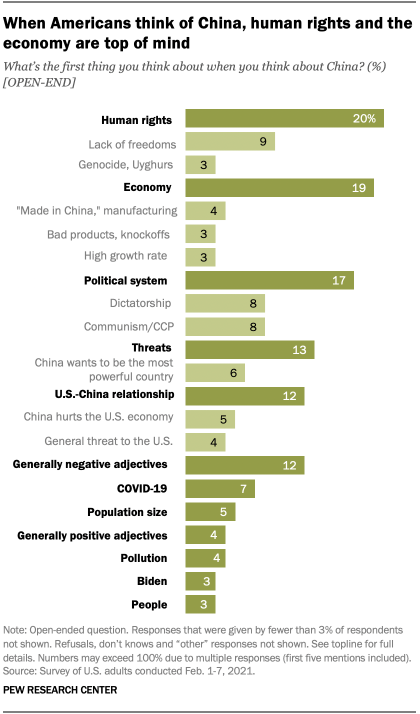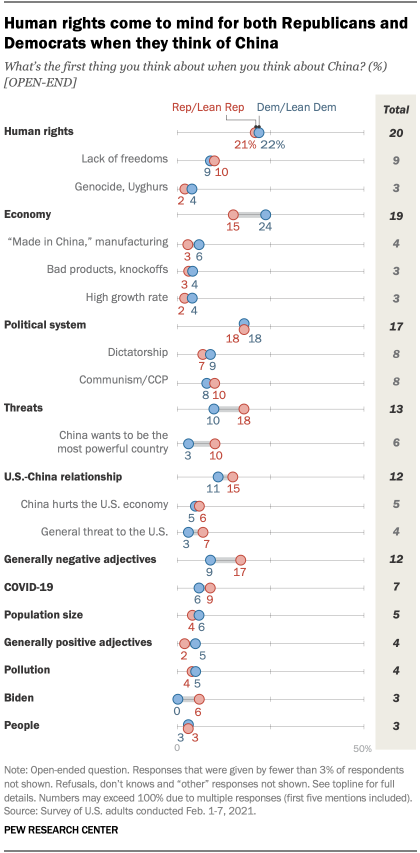Americans’ opinions of China have soured in recent years, according to a new Pew Research Center survey. But what are Americans thinking about when they say they have a negative view of China?
To find out, we asked members of our American Trends Panel to describe, in their own words, the first things that come to mind when they think about China. Then we analyzed the 2,010 responses we received. Many of these responses touched on multiple topics, so we coded the first five things that any individual mentioned.
Americans rarely brought up the Chinese people or the country’s long history and culture in their responses. Instead, they focused primarily on the Chinese government – including its policies or how it behaves internationally – as well as its economy.
This analysis examines volunteered responses from Americans who were asked to describe, in their own words, the first things that come to mind when they think about China.
For this analysis, we surveyed 2,596 U.S. adults in January 2021 and coded 2,010 open-ended responses. We coded the first five mentions in each open-ended response using a researcher-developed codebook.
Everyone who took part in this survey is a member of Pew Research Center’s American Trends Panel (ATP), an online survey panel that is recruited through national, random sampling of residential addresses. This way nearly all U.S. adults have a chance of selection. The survey is weighted to be representative of the U.S. adult population by gender, race, ethnicity, partisan affiliation, education and other categories. Read more about the ATP’s methodology.
Here are the questions used for this report, along with responses, and its methodology.
Overall, around one-in-five U.S. adults mentioned human rights (20%) or the economy (19%) when thinking about China, while a similar share (17%) mentioned the country’s political system. Smaller shares mentioned the perceived threat that China poses (13%) or the U.S.-China relationship (12%). Americans were also much more likely to use generally negative than positive adjectives (12% vs. 4%).
In the case of human rights, some Americans described their view that the Chinese government mistreats its people. Around one-in-ten Americans (9%) specifically highlighted curtailed personal freedoms – whether in the form of censorship, the inability to protest or a lack of freedom of religion. For example, one 45-year-old woman said China is “a country that limits its people and curtails all their freedoms in order to maintain the domination and total control of the people.”
A small share of Americans (3%) explicitly mentioned the Chinese government’s treatment of the Uyghur people, an ethnic minority group in Xinjiang, a region in northwest China. Some respondents used specific terms like “genocide” – a term now applied by the U.S. government, too – or “concentration camps” when discussing the issue. Republicans and Republican-leaning independents were just as likely as Democrats and Democratic leaners (21% vs. 22%) to mention human rights in their responses. Republicans and Democrats also largely agreed on other questions related to human rights in the broader survey.
Despite the general alignment across parties, some Americans were more likely than others to bring up human rights concerns. For example, those who said the U.S. should try to promote human rights in China – even at the expense of economic relations – were more than three times as likely as those who prioritized economic relations to mention human rights in their open-ended answers (26% vs. 7%).
And those who said they follow the news “always” or “most of the time” were about twice as likely as those who follow the news less frequently to mention human rights as top of mind when thinking about China (23% vs. 11%).
Among the roughly one-fifth of Americans who mentioned the economy when thinking about China, many described the country as a manufacturing powerhouse, highlighted the quality of products made there or discussed other facets of its economy, including trade policies, working conditions, intellectual property and the ways in which China is a global economic leader.
Some of these responses were positive, highlighting China’s extensive economic growth. For example, one 28-year-old man said, “China’s accomplishments can’t be denied. Quality of life for the Chinese people has dramatically improved over the last five decades.” Others were factual in nature, describing China’s “rapidly expanding economic system,” the ubiquity of products “made in China” or the fact that China’s economy is one of the largest in the world. Still other responses characterized some darker views of the Chinese economy, such as the view that “Chinese products are generally cheaply made and fail sooner” and the opinion that “Chinese goods [are] made with slave labor” or with “child labor.” Democrats were more likely than Republicans to mention economic topics when thinking about China (24% vs. 15%). Both Republicans and Democrats most frequently mentioned the idea that everything is “made in China” among the various economic subtopics.
About one-in-six Americans (17%) pointed to the political system or the Chinese government when they thought about China. Around one-in-ten (8%) described the country using a term for a non-democratic state, such as “totalitarian,” “autocratic” or “dictatorship.” Another 8% described the system as “communist” or referenced the Chinese Communist Party (CCP) explicitly. One 57-year-old man offered a bleak view of what it would be like to live under such a government: “It’s a place that monitors its population in scary ways. Life there is great – if you aspire to be an automaton working for the state. Otherwise, it’s a corrupt, suffocating, totalitarian society.”
Among those who described China as a global threat, many simply said things like “they want world domination.” Republicans were around twice as likely as Democrats to mention China as a threat (18% vs. 10%, respectively).
Although the question specifically asked people to reflect on China, some respondents mentioned the U.S.-China relationship in their answers. One-in-twenty (5%) referenced the Chinese economy’s impact on the U.S., including the notions that the U.S. is reliant on China for manufactured products, that American debt is held by China, or that Chinese businesses harm American ones. A similar share (4%) described China as a general threat to the U.S. For example, one 74-year-old woman said, “I think that China has it in for the USA and we should be leery when dealing with them.” (In the broader survey, 53% described job losses to China as a very serious problem, and another 43% said the same of the trade deficit.)
The 12% of respondents who offered generally negative adjectives about China used terms such as “greedy,” “trouble,” “scary,” and “selfish” when asked what they think about the country.
Positive adjectives were less common (4% offered these). Some of those who offered positive descriptions highlighted China’s important culture or its long history: For example, one 72-year-old man said, “[China is a] fantastic interesting place,” while another 29-year-old man said it is a “beautiful and culturally rich world power.” The category of positive descriptions encompassed all mentions of the Great Wall, Chinese food and pandas – all of which were mentioned, albeit infrequently.
Meanwhile, nearly one-in-ten Americans (7%) mentioned COVID-19 when they thought of China. A small number (1%) discussed the coronavirus’ origins in Wuhan, in wet markets or from bats in the country. Another 2% placed blame on China for the virus, saying it was at fault and that the country did not tell the rest of the world about it quickly enough. Still, 1% described the virus as made intentionally in a Chinese lab for use as a bioweapon.
In a few cases, respondents expressed admiration for how China handled the virus. One 74-year-old man said, “Despite the virus growth a year ago, I was impressed about how fast they moved to stop the virus spread. They shut down huge cities, built hospitals in just days, followed guidelines we in the U.S. should have like masking, distancing, and so on. They came out of it faster.”
Less frequently mentioned topics in the responses included comments about the size of the Chinese population (5%) or its environmental impact and pollution (4%).
A small share of respondents (3%) mentioned President Joe Biden when asked to reflect on China. These comments were nearly exclusively made by Republicans and expressed the idea that Biden is somehow controlled by China, or, as one 35-year-old woman put it, that the Chinese “are holding at least 3 or 4 of Biden’s puppet strings.”
A separate question on the survey found that 53% of Americans said they were confident in Biden to deal effectively with China, but there was a 64 percentage point gap between Democrats (83% confident) and Republicans (19% confident).
Note: Here are the questions used for this report, along with responses, and its methodology.


